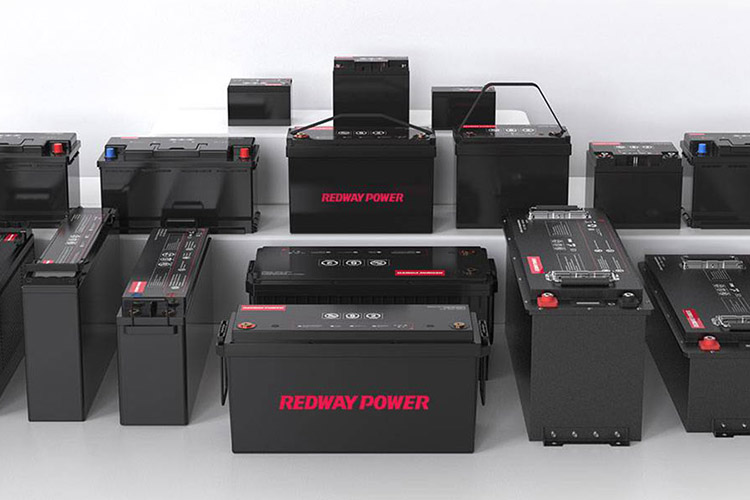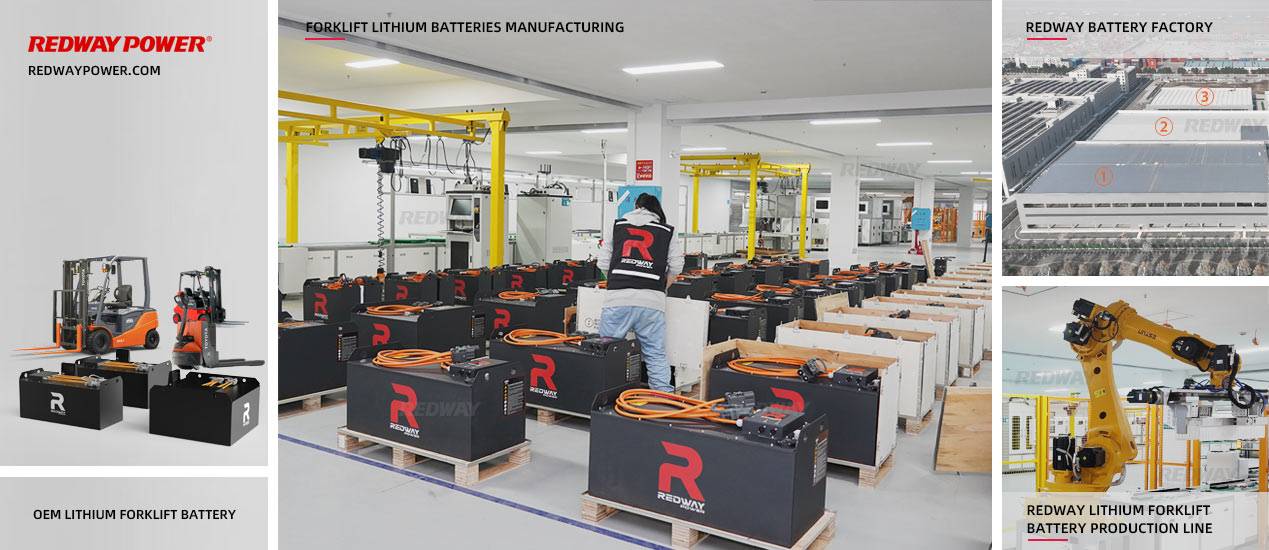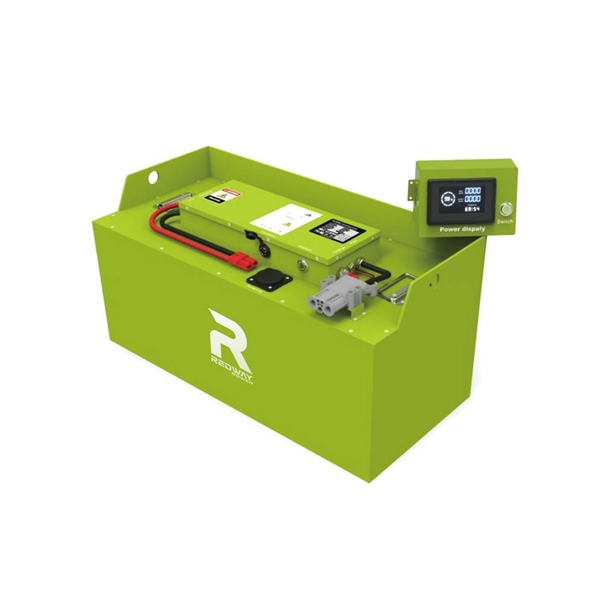-
Home
- About Liduo
- Product Center
- RV lithium battery
- Forklift lithium battery
- Wall mounted lithium battery
- Golf cart lithium battery
- Server rack battery
- lithium iron phosphate battery
- Solution
-
Portable battery
-
Power battery
-
Energy storage battery
-
Server battery
-
Special batteries
-
Household energy storage
- OEM Services
- R&D
- News

 PRODUCT CENTERClassify
PRODUCT CENTERClassifyForklift lithium battery 38.4V 36V 250Ah 240Ah 200Ah
- Type:36V
- Code:

-
Lithium Battery type LiFePO4
Rated voltage 38.4V
Nominal capacity 240Ah
Nominal energy 9.21kWh
Dimensions (L * W * H) 870 x 400 x 430 mm
Weight ~ 250 kg
Operating voltage range 30V-43.8V
- Product Description
The 38.4V 240Ah Forklift Lithium Battery is a high-performance, long-lasting energy solution designed for heavy-duty material handling. Built with LiFePO4 lithium cells, this battery delivers superior efficiency, exceptional cycle life, and enhanced safety. Ideal for OEM, ODM, and wholesale buyers, this battery offers reliable power, high discharge capability, and easy integration into various forklift systems.

Key Features:
· High Capacity and Long Life: 9.21 kWh of nominal energy and a lifespan of over 4000 cycles at 80% Depth of Discharge (DOD), ensuring long-term reliability and low total cost of ownership.
· Powerful Performance: 240A continuous discharge with a 720A peak discharge current (for 3 seconds), designed to handle the power demands of larger forklifts and heavy-duty operations.
· Compact Yet Robust Design: With dimensions of 870 x 400 x 430 mm and a weight of approximately 250 kg, this battery fits most heavy-duty forklift models without compromising on performance.
· Advanced Safety Features: The smart BMS monitors vital parameters such as SOC, cell temperature, voltage, and more, ensuring maximum safety with built-in protections against overcharge, overdischarge, and short circuits.
· Wide Operating Range: Designed to operate in extreme temperatures from -20°C to 60°C, and features an IP65 rating for protection against dust and water ingress, making it suitable for a variety of industrial environments.
Product Description:
The 38.4V 240Ah Forklift Lithium Battery is engineered for high-performance, durability, and efficiency, making it the perfect solution for OEM, ODM, and wholesale buyers who need a reliable power source for their material handling equipment. With a nominal energy capacity of 9.21 kWh and 240Ah capacity, this lithium-ion battery is capable of handling high demand, ensuring optimal power delivery for even the most demanding forklifts and industrial vehicles.

Wholesale lithium golf cart batteries with 10-year life? Check here.
This robust battery delivers continuous discharge power of 240A, with the ability to handle 720A peak discharge (for 3 seconds), allowing it to easily manage high-power operations, such as lifting heavy loads or navigating steep inclines. Its compact size of 870 x 400 x 430 mm and weight of 250 kg make it ideal for larger forklift models, while still offering space efficiency and easy integration.
The 38.4V 240Ah Forklift Lithium Battery features a cycle life of over 4000 cycles at 80% Depth of Discharge (DOD), providing exceptional longevity. This results in fewer replacements and reduced maintenance costs, contributing to the battery’s cost-effectiveness over time.
Safety is a key priority in the design of this battery. It comes with an advanced Battery Management System (BMS) that continuously monitors the State of Charge (SOC), system voltage, current, cell voltage, and cell temperature, ensuring that the battery operates within safe parameters. The BMS also provides protection against overcharge, overdischarge, overcurrent, overvoltage, low-voltage, overtemperature, and short circuits, safeguarding both the battery and the connected equipment.
Designed for versatility, this battery operates effectively in temperature ranges from -20°C to 60°C, making it suitable for both indoor and outdoor industrial applications. Its IP65 rating ensures it is protected from dust and water, allowing it to endure harsh operating conditions with ease. The natural cooling system eliminates the need for additional cooling mechanisms, simplifying maintenance and ensuring optimal efficiency.

Want OEM lithium forklift batteries at wholesale prices? Check here.
With integrated RS485, CAN-bus, and 4G communication capabilities, the 38.4V 240Ah Forklift Lithium Battery supports remote monitoring, allowing businesses to track performance metrics in real-time. This communication setup is ideal for fleet management systems, making it easier to monitor battery health, performance, and efficiency.
For OEM, ODM, and wholesale buyers, the 38.4V 240Ah Forklift Lithium Battery is a powerful, safe, and cost-effective solution for your material handling needs, offering reliable performance and long-term value.
Specifications Lithium Cell Type LiFePO4 Nominal Voltage 38.4V Nominal Capacity 240Ah Nominal Energy 9.21kWh Dimensions (L*W*H) 870 x 400 x 430 mm Weight ~250 kg Max Charge Current 120A (Continuous) Max Discharge Current 240A (Continuous) Peak Discharge Current 720A (3s) Operating Voltage Range 30V–43.8V IP Rating IP65 Cooling Natural Cooling Cycle Life >4000 cycles (DOD 80%) Charge Temperature 0℃ – 55℃ Discharge Temperature -20℃ – 60℃ Battery Shell Metal Communication RS485, CAN-bus, 4G Warranty 5 years BMS Protection Advanced smart BMS monitoring SOC, system voltage, current, cell voltage, cell temperature, overcharge, overdischarge, overcurrent, overvoltage, low-voltage, overtemperature, short circuit, etc. Group 1: 36V 200Ah Lithium Forklift Batteries
What forklift models use 36V 200Ah lithium batteries?
Forklift models like Toyota’s 8FB and Hyster’s J1.6-2.0XNL often use 36V 200Ah lithium batteries. These models are designed for material handling tasks that benefit from the energy efficiency and performance of lithium technology.How does 36V 200Ah lithium compare to lead-acid?
A 36V 200Ah lithium battery offers faster charging, longer lifespan, and higher efficiency compared to lead-acid. Lithium batteries are lighter, require less maintenance, and provide consistent power, while lead-acid batteries are heavier, require regular water checks, and have shorter life cycles.Charging time for 36V 200Ah lithium forklift battery?
The charging time for a 36V 200Ah lithium forklift battery is typically between 1.5 to 3 hours, depending on the charger’s output. Fast charging features make lithium batteries a more efficient option for continuous forklift operation.Lifespan cycles of 36V 200Ah lithium batteries?
A 36V 200Ah lithium battery typically lasts between 2,000 to 5,000 charge cycles, depending on usage and maintenance. This is significantly longer than lead-acid batteries, which generally last between 500 to 1,500 cycles.Safety features in 36V 200Ah lithium forklift batteries?
36V 200Ah lithium forklift batteries include built-in safety features such as thermal management systems, overcharge protection, short-circuit prevention, and Battery Management Systems (BMS) to ensure safe operation and to prevent overheating or damage.Maintenance requirements for 36V 200Ah lithium batteries?
Lithium batteries require minimal maintenance. Regular checks for damage, cleaning the terminals, and ensuring proper storage at the recommended temperature are important. Unlike lead-acid batteries, they do not require water filling or frequent electrolyte checks.Group 2: 250Ah vs 240Ah Forklift Batteries
How do 250Ah vs 240Ah batteries affect forklift runtime?
A 250Ah battery offers slightly longer runtime compared to a 240Ah battery due to its higher capacity, providing more energy. This can be beneficial for longer shifts or heavier usage, reducing the need for frequent recharges.What efficiency differences exist between 250Ah and 240Ah?
The efficiency difference between 250Ah and 240Ah batteries is minimal. Both perform similarly, but the 250Ah battery can provide a bit more energy per charge, which is beneficial for longer operational hours or more intensive tasks.Which battery offers better cost per cycle performance?
A 250Ah battery typically offers better cost per cycle performance due to its higher capacity and longer runtime. This means fewer charge cycles over time, making it more cost-effective in terms of energy usage and lifespan compared to a 240Ah battery.How does capacity variance impact charging frequency?
A 250Ah battery will need to be charged less frequently than a 240Ah battery because it has a larger energy reserve. This results in longer usage periods between charges, making it ideal for operations requiring longer runtime or less downtime for recharging.Do 250Ah batteries have longer lifespan than 240Ah?
While both 250Ah and 240Ah batteries have similar lifespans, the 250Ah battery may offer a longer useful life in certain applications due to fewer charging cycles required. However, lifespan is more dependent on proper maintenance and usage than just capacity.Which battery handles high-load operations more effectively?
A 250Ah battery handles high-load operations more effectively than a 240Ah battery. With a higher capacity, it provides more consistent power under heavy loads, improving overall efficiency and reducing the likelihood of performance dips during intense work cycles.Group 3: 38.4V 250Ah Forklift Batteries
What are key specs for 38.4V 250Ah forklift batteries?
Key specs for a 38.4V 250Ah forklift battery include a nominal voltage of 38.4V, a capacity of 250Ah, energy output of around 9.6 kWh, and a typical weight of 300-500 kg. These batteries are designed for heavy-duty material handling, offering longer run times and faster charging compared to traditional lead-acid models.How do safety features differ among lithium-ion models?
Safety features in lithium-ion forklift batteries vary but often include thermal management systems, overcharge protection, short-circuit protection, and a Battery Management System (BMS) to monitor and protect the battery from damage. Higher-end models may include fire-resistant enclosures and advanced fault detection systems.What lifespan and cycle count should buyers expect?
Buyers can expect a lifespan of 2,000 to 5,000 charge cycles for 38.4V 250Ah lithium-ion batteries, depending on usage, maintenance, and operational conditions. This is significantly higher than lead-acid alternatives, which generally last between 500 to 1,500 cycles.Are there specific maintenance requirements for this battery?
Lithium-ion batteries like the 38.4V 250Ah require minimal maintenance. Regular inspections for physical damage, terminal cleanliness, and ensuring proper storage conditions are recommended. Unlike lead-acid batteries, there’s no need for water filling or frequent electrolyte checks.Which certifications ensure quality and compliance standards?
Certifications for 38.4V 250Ah lithium-ion forklift batteries include CE (European Conformity), UL (Underwriters Laboratories), IEC (International Electrotechnical Commission), and ISO (International Organization for Standardization). These certifications ensure the battery meets safety, environmental, and quality standards.How to compare charging efficiency across manufacturers?
To compare charging efficiency, look at the charging time and energy consumption specifications for each manufacturer. Higher efficiency is indicated by shorter charging times with minimal energy loss. Checking for fast-charging capabilities and battery temperature management features can also provide insights into performance differences.Group 4: Charging, Maintenance, and Troubleshooting
How to charge 36V 240Ah forklift lithium batteries correctly?
To charge a 36V 240Ah lithium forklift battery, use a compatible charger with the correct voltage and current settings. Charge the battery fully after each shift, avoiding overcharging. Ensure the battery is not left on charge once it reaches 100%. Do not charge below 20% state of charge to prevent deep discharge damage.Best practices for extending lithium forklift battery lifespan?
To extend the lifespan of a lithium forklift battery, avoid overcharging and deep discharging. Maintain a charge level between 20% and 80% whenever possible. Store the battery in a cool, dry place, and clean the terminals regularly. Ensure the battery is properly ventilated during use to prevent overheating.Common maintenance mistakes with 36V 240Ah lithium batteries?
Common mistakes include overcharging, deep discharging, improper storage (exposing the battery to extreme temperatures), and neglecting to clean battery terminals. Additionally, using an incompatible charger or failing to inspect the battery regularly for damage can reduce the battery’s efficiency and lifespan.Troubleshooting steps for lithium forklift battery failures?
If a lithium forklift battery fails, first check for visible damage or loose connections. Ensure the charger is functioning properly and matches the battery’s specifications. Test the battery voltage and check the Battery Management System (BMS) for error codes. If issues persist, consult the manufacturer or a certified technician for further diagnostics.Safety guidelines for storing long-lasting forklift batteries?
Store forklift batteries in a dry, well-ventilated area away from direct sunlight or extreme temperatures. Keep the battery at a charge level of about 40-60% during long-term storage. Ensure the area is free from flammable materials and follow the manufacturer’s specific storage instructions for safety.Optimal temperature conditions for lithium battery performance?
The optimal temperature range for lithium forklift batteries is between 20°C to 25°C (68°F to 77°F). Avoid storing or using batteries in temperatures above 45°C (113°F) or below -10°C (14°F), as extreme temperatures can reduce battery efficiency, shorten lifespan, and cause potential damage.Group 5: 38.4V 200Ah Lithium Forklift Battery
What is the voltage and capacity of 38.4V 200Ah lithium forklift battery?
The 38.4V 200Ah lithium forklift battery has a nominal voltage of 38.4V and a capacity of 200Ah, which provides an energy output of approximately 7.68 kWh. This combination offers a good balance of power for medium-duty to heavy-duty material handling applications.How many cycles can 38.4V 200Ah lithium battery endure?
The 38.4V 200Ah lithium forklift battery typically endures between 2,000 to 5,000 charge cycles, depending on usage and maintenance. This is significantly higher than lead-acid batteries, which generally last between 500 to 1,500 cycles.What is the charging time for 38.4V 200Ah lithium forklift battery?
The charging time for a 38.4V 200Ah lithium forklift battery is typically between 1.5 to 3 hours, depending on the charger’s output. Fast charging capabilities reduce downtime, allowing forklifts to be back in operation quickly.What operating temperature range suits 38.4V 200Ah lithium battery?
The optimal operating temperature range for the 38.4V 200Ah lithium battery is between 20°C to 25°C (68°F to 77°F). Extreme temperatures outside of this range can reduce efficiency and battery lifespan. It's important to avoid temperatures above 45°C (113°F) or below -10°C (14°F).Energy density comparison: 38.4V 200Ah lithium vs lead-acid?
Lithium batteries like the 38.4V 200Ah have significantly higher energy density compared to lead-acid batteries. Lithium-ion batteries provide more energy in a smaller, lighter package, which results in improved efficiency, longer runtimes, and reduced weight, while lead-acid batteries are bulkier and heavier for the same energy output.Maintenance requirements for 38.4V 200Ah lithium forklift battery?
38.4V 200Ah lithium forklift batteries require minimal maintenance. Routine checks for physical damage, ensuring proper connections, and cleaning terminals are recommended. There’s no need for water filling or electrolyte checks, as is required with lead-acid batteries. Keeping the battery in a cool, dry environment helps optimize performance and lifespan.Group 6: 36V 250Ah Lithium Forklift Batteries
What are top 36V 250Ah lithium forklift battery brands?
Top 36V 250Ah lithium forklift battery brands include Tesla, BYD, Samsung SDI, CATL, Redway Battery, and LiFeBATT. These brands are known for their high-quality, reliable batteries that offer longer lifespan, faster charging, and enhanced efficiency compared to traditional lead-acid batteries.How does 36V 250Ah battery improve forklift performance?
A 36V 250Ah lithium forklift battery improves performance by providing consistent power, enabling longer runtimes, faster charging, and reduced downtime. Lithium batteries offer higher energy density and more efficient use of available power, allowing forklifts to handle heavy loads for extended periods with less maintenance.What safety features do 36V 250Ah lithium batteries offer?
36V 250Ah lithium batteries include advanced safety features like overcharge protection, short-circuit prevention, thermal management, and Battery Management Systems (BMS) that monitor voltage, current, and temperature. Some models also have fire-resistant enclosures and auto-shutoff mechanisms to prevent damage during extreme conditions.36V 250Ah vs lead-acid: which is better for forklifts?
36V 250Ah lithium batteries are generally better for forklifts compared to lead-acid batteries. Lithium batteries offer longer lifespan, faster charging, reduced maintenance needs, and higher energy density, resulting in more consistent power output. Lead-acid batteries are heavier, require more frequent maintenance, and have a shorter cycle life.How long to charge a 36V 250Ah lithium forklift battery?
A 36V 250Ah lithium forklift battery typically charges in 2 to 3 hours, depending on the charger’s output. Fast charging technology is available for lithium batteries, reducing downtime and ensuring that forklifts can be back in operation quickly.What's the lifespan of a 36V 250Ah lithium forklift battery?
The lifespan of a 36V 250Ah lithium forklift battery is typically between 2,000 to 5,000 charge cycles, depending on usage and proper maintenance. This is significantly longer than lead-acid batteries, which generally last between 500 to 1,500 cycles.
-
About Us
Company Profile History Organizational Honor -
Product Center
Forklift lithium battery Rv lithium battery Wall-mounted lithium battery Golf cart lithium battery -
Solution
Energy storage battery Power battery Server battery -
Know us
News center Contact us -
Contact us
0769-89333805 No. 78, Puxing East Road, Qingxi Town, Dongguan City mg@redwaycn.com
Copyright 2025 Dongguan Liduowei new energy Co., LTDTechnical support:Emore - About Liduo


